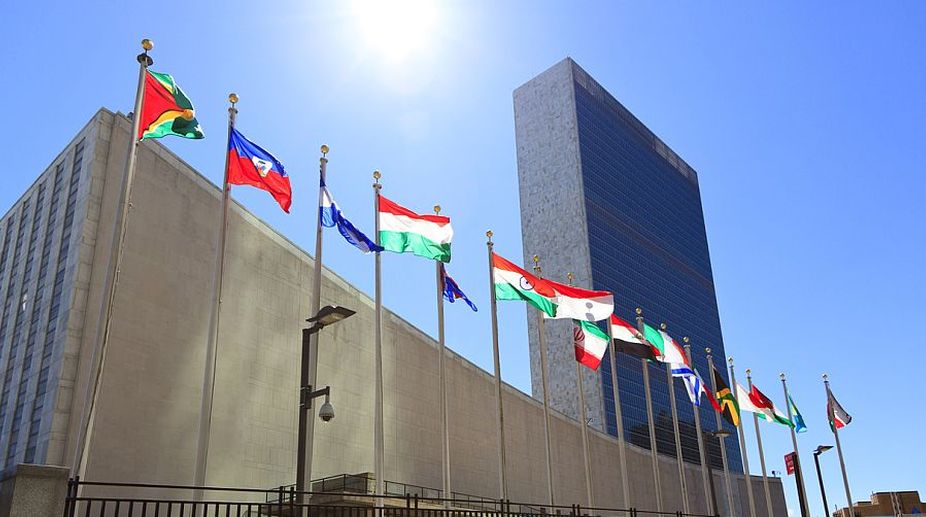The annual election to choose five new non-permanent members of the UN Security Council produced both the expected and the near preposterous. The elections, actually selections by the 193-member General Assembly, saw no opposition for any of the two- year Council terms. Candidates were chosen based on the time-honored rule of both geographical representations as well as behind the scenes lobbying for a coveted place on the fifteen-member Council.
Let's take a look at the candidates who will serve alongside the five permanent Council members; China, France, Russia, the United Kingdom and the United States.
Africa: Two seats were filled for the African continent. Cote d'Ivoire (Ivory Coast) a country just emerging from a civil conflict was chosen. A former French colony in West Africa, since 2002 the country faced a spiral of ethnic and religious violence which prompted sending a U.N. Peacekeeping mission which is only now ending its mission after thirteen years. Cote d'Ivoire replaces Senegal.
Equatorial Guinea, an oil rich microstate on the African coast presents a far deeper moral and political challenge. Although its candidacy was endorsed by the African Union regional group, Equatorial Guinea stands as a stereotypical post-modern dictatorship and a glaring affront both to the Security Council and to democratic Africa.
According to Human Rights Watch, "Corruption, poverty, and repression continue to plague Equatorial Guinea under President Teodoro Obiang Nguema Mbasogo, who has been in power since 1979, making him the world's longest serving non-royal head of state."
Despite the country's oil wealth, the socio/economic standing for the majority of the population is dismal. Political and civil rights according to the human rights monitor Freedom House stand at 7 out of 100, actually below Cuba but just ahead of Eritrea and Somalia. Equatorial Guinea replaces Egypt, a close American friend.
Asia-Pacific: Kuwait assumes the Asian seat replacing Japan. Recall it was the 1990 invasion of sovereign Kuwait by Saddam's Iraq, which triggered this current spiral of instability in the Middle East. A close American ally, Kuwait has offered significant humanitarian aid to help Syrian refugees.
U.S. United Nations Ambassador Nikki Haley met with Kuwait's foreign minister to discuss cooperation "in particular defeating ISIS and finding peaceful solutions to Mid East conflicts."
East Europe: Poland, a founding U.N. member assumes the seat currently held by Ukraine.
Poland has served five times on the Council and brings a level of professionalism as an EU and NATO member. The last time Poland was on the Council, 1997, the Warsaw government distinguished itself as a proud and articulate member of the newly freed Europe. Poland builds upon its past diplomacy and service to U.N. Peacekeeping where since 1953 the country contributed 70,000 troops to thirty different missions.
Latin America/Caribbean: Peru assumes the helm for Latin America. Another founding state of the U.N. in 1945, Peru has served four terms on the Council as recently as a decade ago. Peru replaces Uruguay, whose two-year tenure was marked by a level of quiet and dedicated professionalism.
West Europe: Last year, given a deadlock in a vote between both Italy and the Netherlands, in which neither could gain the required two-thirds majority, both EU members decided on an elegant solution; split the term. Italy got 2017 and now the Netherlands shall preside over 2018. Dutch Foreign Minister Bert Koenders asserted, "The Netherlands will be a proactive partner."
Let's look at the overall Council dynamics and what the new members mean for U.S. policy.
Over the past five years the Security Council has been locked in an East/West standoff regarding Syria and Russian actions in Ukraine. Polarisation among the veto-wielding Permanent Five rests along the U.S./U.K./France vs Russia/China fault-line. Here's how the new members will likely stand: Cote d'Ivoire, like Senegal, will tilt toward France and often the U.S. Equatorial Guinea, given its human rights record, will fit in comfortably with the Moscow/Beijing axis.
Kuwait will favour the U.S. on some issues especially in the wake of the Trump Administration's reinvigorated foreign and security policies toward Saudi Arabia and the Arab Gulf. Still, it will be hard to replace Japan's focused and cooperative policies which have been of particular help in the ongoing North Korean crisis.Peru, a free and largely democratic country, should largely be in concert with Washington.
Poland, as a European Union and NATO member will be a reliable and good U.S. ally. The Netherlands, as with Italy before, clearly reflects Western values. Overall slight advantage to the U.S. when the new members take their seats in January 2018.











